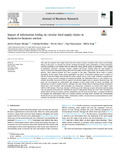| dc.contributor.author | Kumar Mangla, S. | |
| dc.contributor.author | Boruhan, G. | |
| dc.contributor.author | Ersoy, P. | |
| dc.contributor.author | Kazancoglu, Y. | |
| dc.contributor.author | Song, M. | |
| dc.date.accessioned | 2021-08-20T07:52:33Z | |
| dc.date.available | 2021-08-20T07:52:33Z | |
| dc.date.issued | 2021 | |
| dc.identifier.issn | 0148-2963 | |
| dc.identifier.uri | https://dspace.yasar.edu.tr/xmlui/handle/20.500.12742/11540 | |
| dc.description.abstract | This study has analyzed food supply chains from the circular economy viewpoint with a focus on knowledge hiding. In this paper, we examine the practice of hiding knowledge among stakeholders, in which dimension, what this knowledge is and whether there are differences among specific groups of stakeholders. This is applied to distributors, producers, consumers, retailers, suppliers and farmers working within the meat industry in Turkey. It shows how information hiding affects the traceability of food supply chains and circularity in the meat industry. Three different theories have been examined in this paper. Stakeholder theory helps to analyze traceability of food supply chains among stakeholders; the theory of industrial symbiosis aims to achieve an efficient circular food supply chain through 9R (refuse, rethink, reduce, reuse, repair, refurbish, remanufacture, repurpose, recycle, recover) strategies by adopting traceability; the information theory is a key enabler to coordinate traceability from farm to fork to support a circular food supply chain. By using the theoretical lens, this paper sets out proposals for policymakers and managers in food supply chains to ensure traceability and transparency to achieve circular economy. Although some prior studies address knowledge hiding, information hiding hasn't been examined with traceability and transparency dimensions in Circular Food Supply Chain (CFSC) in B2B business. This study attempts to fill this gap in the literature, improve theoretical understanding with our proposed framework and validating the impact of information hiding and reveal where knowledge is mostly hidden in terms of circular economy, stakeholders and 9Rs in the meat industry. A proposed framework for managers and policymakers based on a circular economy can bring social, economic and environmental benefits for the red meat industry in Turkey. Additionally, it offers a framework and recommendations for other countries and industries for possible adoption. | en_US |
| dc.language.iso | English | en_US |
| dc.publisher | Elsevier | en_US |
| dc.rights | info:eu-repo/semantics/openAccess | en_US |
| dc.subject | Circular food supply chain | en_US |
| dc.subject | Knowledge hiding | en_US |
| dc.subject | Meat industry | en_US |
| dc.subject | Traceability | en_US |
| dc.subject | Transparency | en_US |
| dc.title | Impact of information hiding on circular food supply chains in business-to-business context | en_US |
| dc.type | Article | en_US |
| dc.relation.journal | Journal of Business Research | en_US |
| dc.identifier.doi | 10.1016/j.jbusres.2021.06.013 | en_US |
| dc.contributor.department | Department of Logistics Management | en_US |
| dc.identifier.issue | 135 | en_US |
| dc.identifier.startpage | 1 | en_US |
| dc.identifier.endpage | 18 | en_US |
| dc.identifier.scopus | https://www.scopus.com/record/display.uri?eid=2-s2.0-85107928393&origin=SingleRecordEmailAlert&dgcid=raven_sc_search_en_us_email&txGid=549da2ac6028317ebee1eaef68d7c4e4 | en_US |
| dc.contributor.yasarauthor | 0000-0001-8196-0158: Pervin Ersoy Ataç | en_US |















